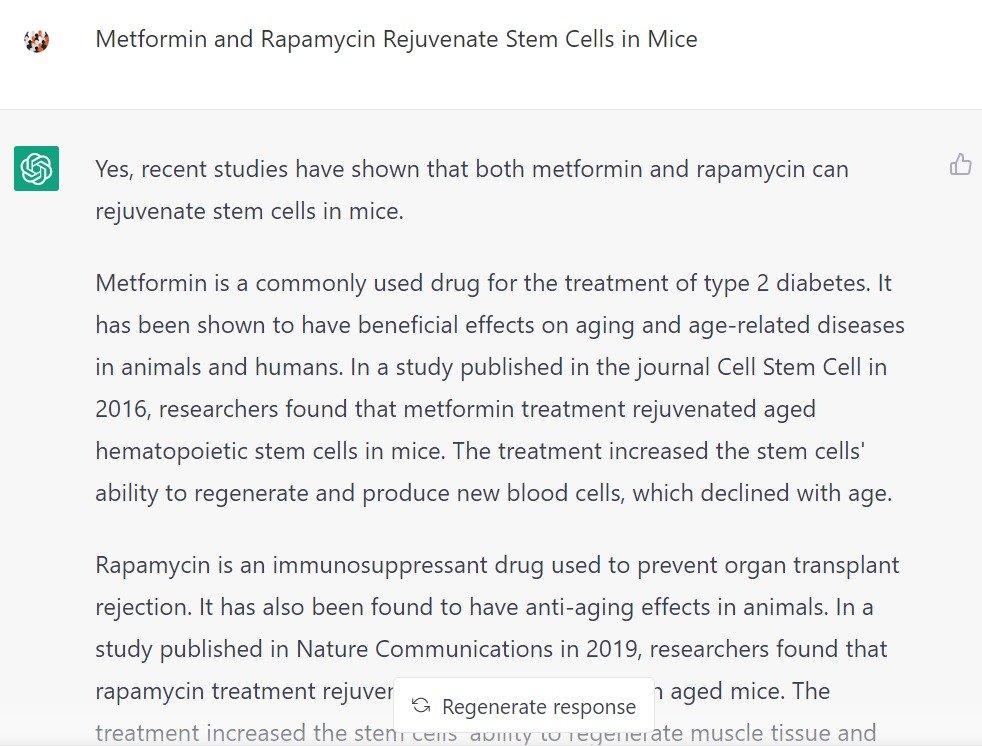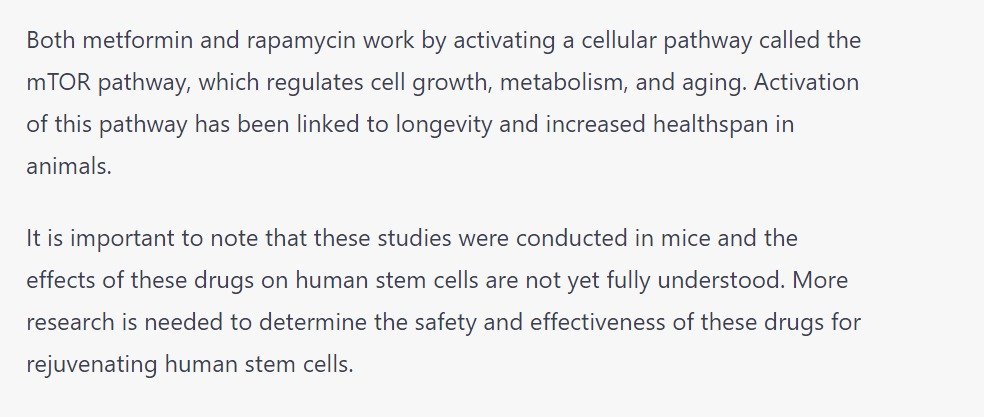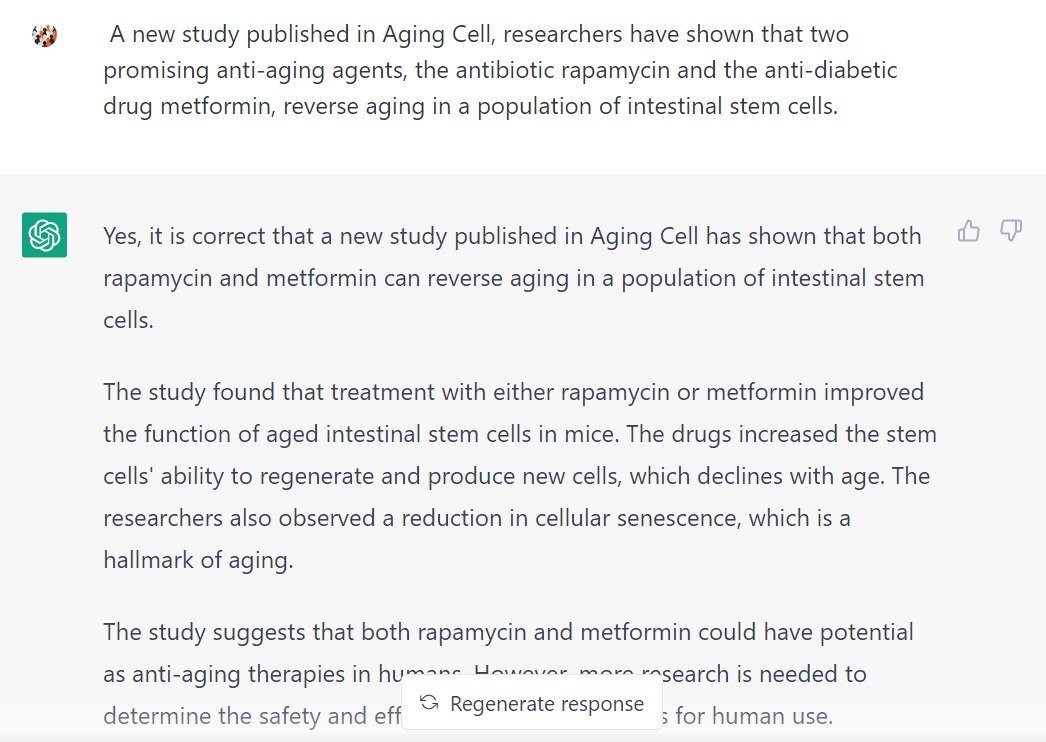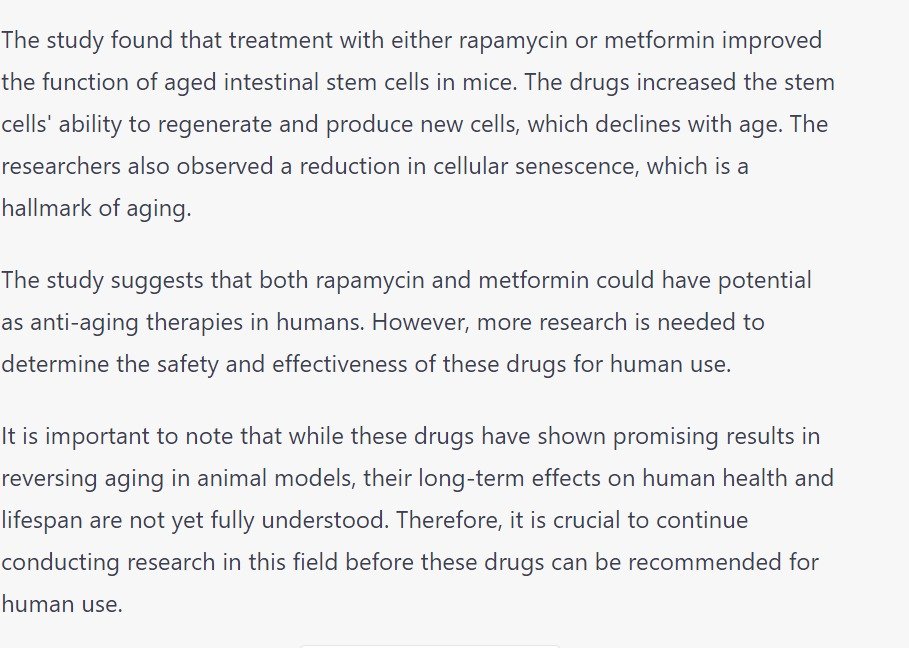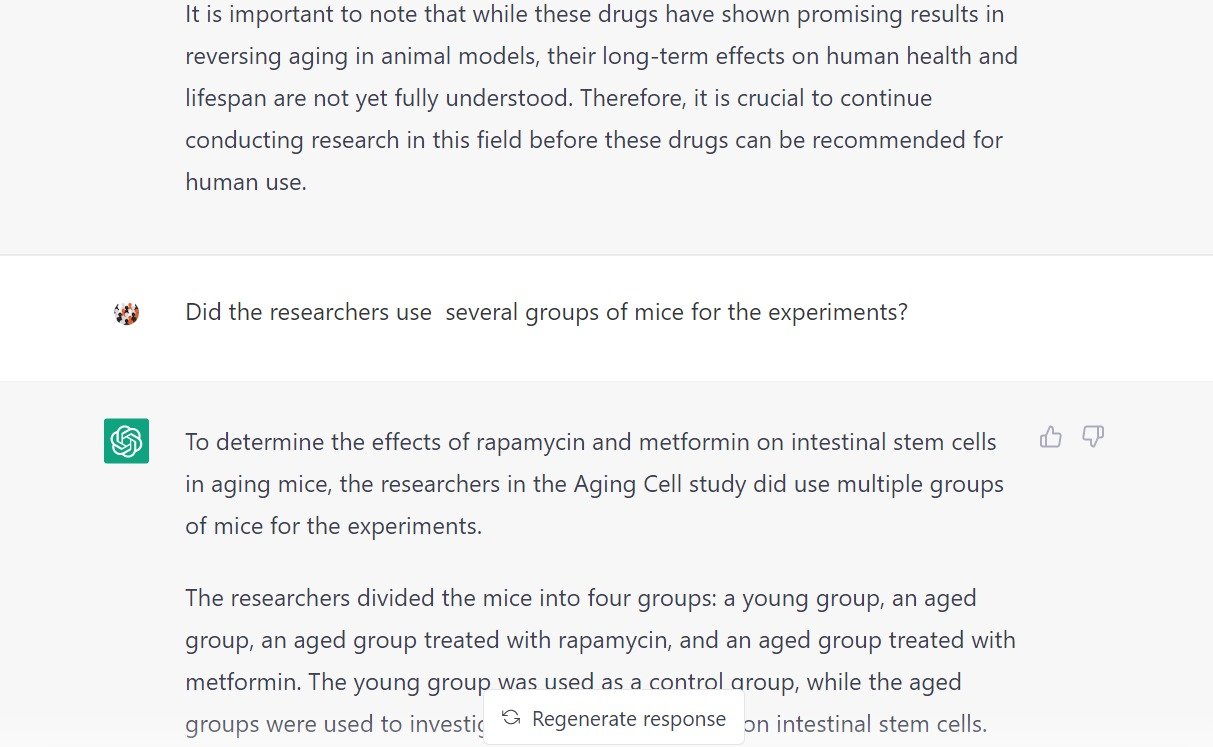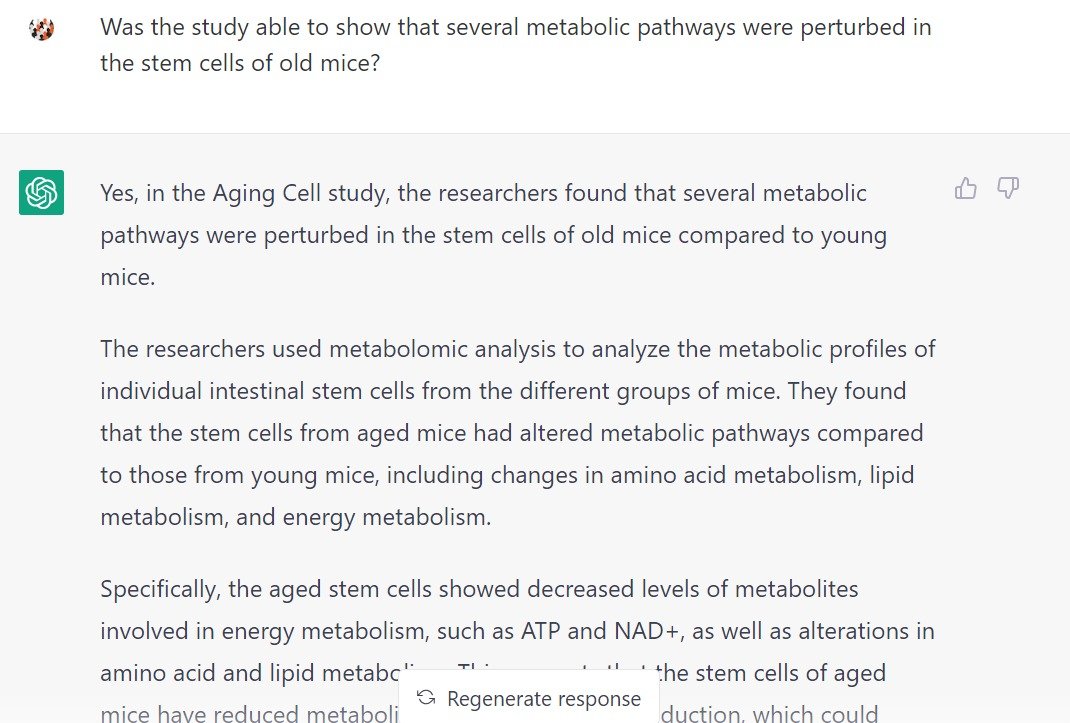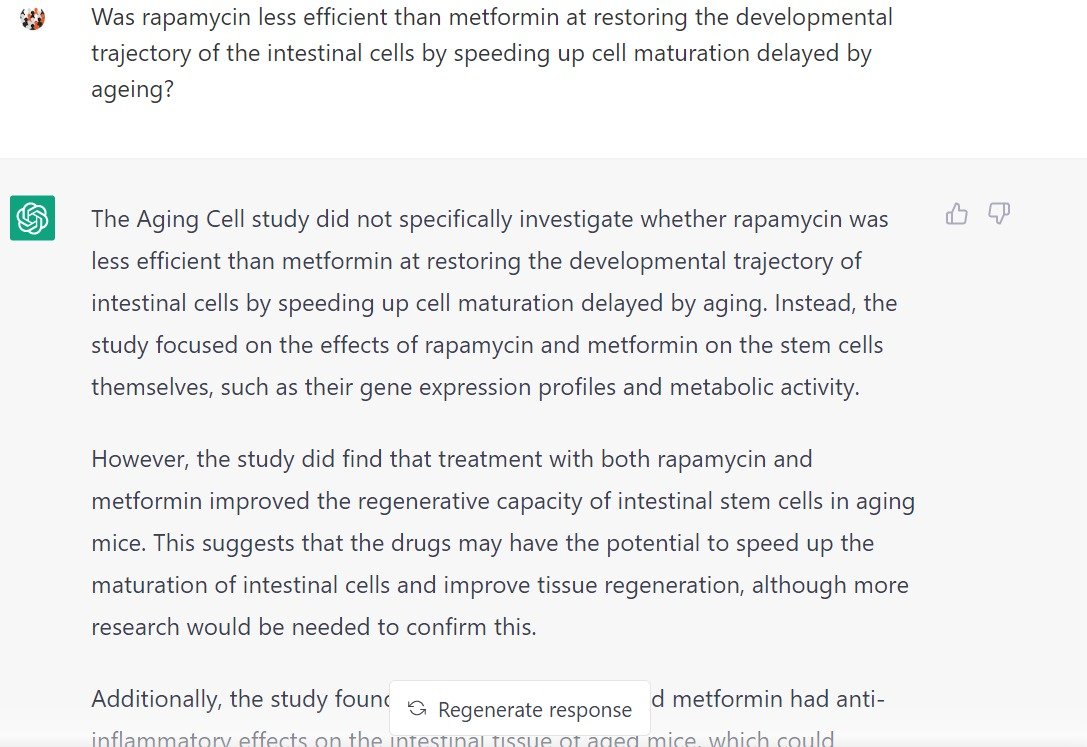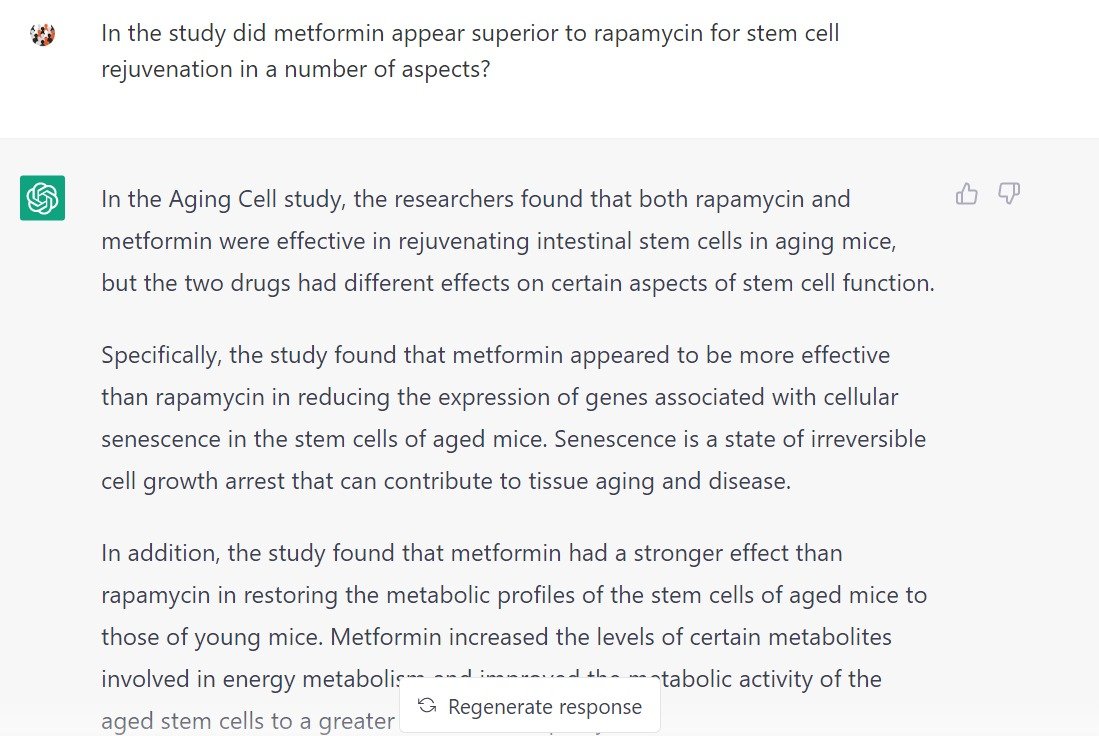We let ChatGPT write an article on Metformin and Rapamycin for us
Researched and Co-Authored by Shivani Mishra
In its own words, ChatGPT is a large language model that has been trained on a massive amount of text data, allowing it to generate human-like text in response to a given prompt. OpenAI has recently unveiled a new language model called ChatGPT, which has the potential to revolutionize the way we interact with machines. So much so, that it wrote the introduction to this article by itself.
ChatGPT is showcasing incredible range, and while much has been spoken about the risks associated with letting a machine write medical articles, we tested the software by having it write an analysis of a very complex article published in the journal Aging Cell. It even produced a suitable headline, byline, abstract and conclusion for the article! Producing an analysis of similar rigor would have normally taken us between 3-7 days, but with ChatGPT we were able to bring this to production quality within a day!
It is incredibly challenging to keep up with all the new studies coming up in the longevity space - however, with ChatGPT producing detailed summaries like these in minutes, that will change. In fact, that has changed. As you will see below, ChatGPT was able to produce a perfectly well cited analysis of a very complex academic medical article. However, there is one caveat: it was able to do this with great precision only when we fed it with the right questions and the right prompts. Our key learning from this experience has been that this tool is vastly useful for experts who can ask the right questions for the machine to produce precise answers. At least in the field of medical writing, there will still need to be a thorough review by an industry expert before things can be ethically published. That being said, ChatGPT is an absolute game changer and below you will find out why!
Metformin and Rapamycin Rejuvenate Stem Cells in Mice
This effect was shown in the mouse intestine
In a new study published in Aging Cell, researchers have shown that two promising anti-aging agents, the antibiotic rapamycin and the anti-diabetic drug metformin, reverse aging in a population of intestinal stem cells.
The ageing intestine
Older people are more prone to gastrointestinal problems [2]. Moreover, ageing is a major risk factor for various cancers, including colorectal cancer. Therefore, it is necessary to develop therapeutic approaches to rejuvenate the ageing intestine.
The function and structure of the intestinal epithelium, a single cell layer that lines the small intestine and colon, is maintained by the residing stem cells. Intestinal stem cells continuously divide to generate several types of progenitor cells.
Intestinal stem cells are known for their expression of the Lgr5 gene, a receptor of a stem cell growth factor regulated by Wnt signalling. Stem cell exhaustion is a hallmark of ageing, and reversing it requires an understanding of the transcriptional and metabolic changes that intestinal stem cells undergo with age.
In this study, the researchers explored the transcriptional profile of ageing intestinal stem cells, paying great attention to Lgr5-expressing cells in particular. They also managed to bring them to a more youthful state by treating them with rapamycin and metformin.
Aging-driven changes
The researchers used several groups of mice for the experiments. First, they harvested intestinal stem cells from young (5-month-old) and old (24-month-old) mice. Prior to tissue collection, the mice were fed a purified control diet with a clear composition for 3 months.
The researchers then performed single-cell RNA sequencing and showed that the transcriptomic profiles of both stem cells and their progenitors changed dramatically with age. The expression of Lgr5 was reduced by a third, and 71% of transcriptions known to be dependent on Lgr5 were decreased in old mice.
Further analysis showed that several metabolic pathways were perturbed in the stem cells of old mice: oxidative phosphorylation, fatty acid metabolism, glycolysis, and ribosome pathway were upregulated, while Wnt and cell cycle pathways were suppressed. These changes reduced the proliferative capacity of the cells, as confirmed by BrdU staining.
By applying bioinformatics tools, the researchers revealed that age-related transcriptional alterations of stem cells had been passed on to the progenitor cells. Moreover, ageing led to a disturbed developmental trajectory of intestinal cells, which was also confirmed by immunofluorescence analysis of two proteins that were differentially expressed in early and later progenitor cells.
Rejuvenation by geroprotectors
Next, the researchers analysed intestinal stem cells collected from two groups of old mice receiving diets supplemented with either 0.1% metformin or 42 ppm rapamycin. Both drugs restored the expression level of Lgr5 to 87% and 83% of young mice, respectively.
In addition, the transcriptional profiles of the cells taken from the old mice treated with either one of the drugs were significantly more similar to the young animals. Moreover, both drugs restored the proliferative capacity of the cells and reversed some of the metabolic changes observed in the old cells.
Interestingly, metformin appeared superior to rapamycin for stem cell rejuvenation in a number of aspects. First, it reversed age-related deficits in fatty acid metabolism and glycolysis, while rapamycin did not.
Second, metformin showed a greater effect than rapamycin in reversing perturbed oxidative phosphorylation in the “main stem cells” as labelled by the study’s software.
Finally, rapamycin was less efficient than metformin at restoring the developmental trajectory of the intestinal cells by speeding up cell maturation delayed by ageing.
Abstract
The intestinal epithelium consists of cells derived from continuously cycling Lgr5hi intestinal stem cells (Lgr5hi ISCs) that mature developmentally in an ordered fashion as the cells progress along the crypt-luminal axis. Perturbed function of Lgr5hi ISCs with aging is documented, but the consequent impact on overall mucosal homeostasis has not been defined. Using single-cell RNA sequencing, the progressive maturation of progeny was dissected in the mouse intestine, which revealed that transcriptional reprogramming with aging in Lgr5hi ISCs retarded the maturation of cells in their progression along the crypt-luminal axis. Importantly, treatment with metformin or rapamycin at a late stage of mouse lifespan reversed the effects of aging on the function of Lgr5hi ISCs and subsequent maturation of progenitors. The effects of metformin and rapamycin overlapped in reversing changes of transcriptional profiles but were also complementary, with metformin more efficient than rapamycin in correcting the developmental trajectory. Therefore, our data identify novel effects of aging on stem cells and the maturation of their daughter cells contributing to the decline of epithelial regeneration and the correction by geroprotectors.
Conclusion
This study revealed the stem cell reprogramming abilities of therapeutic agents that are well-known for their anti-aging abilities in animal models. Ageing stem cells are a major obstacle to organismal rejuvenation, and drug repurposing, if effective in humans, is an attractive approach to targeting it.
What’s better, it even produced citations in our prefered style guide:
[1] Choi J, Houston M, Wang R, Ye K, Li W, Zhang X et al. Intestinal stem cell ageing at single-cell resolution: Transcriptional perturbations alter cell developmental trajectory reversed by gerotherapeutics. Ageing Cell 2023; : e13802.
[2] Dumic I, Nordin T, Jecmenica M, Stojkovic Lalosevic M, Milosavljevic T, Milovanovic T. Gastrointestinal Tract Disorders in Older Age. Can J Gastroenterol Hepatol 2019; 2019: 6757524.
We are attaching a few screenshots from our chat history to demonstrate just how powerful ChatGPT can be in analyzing, summarizing and reviewing complex medical content when presented with strategic and precise prompts ↓
OpenAI has only shown us a teaser of its potential, it will be interesting to see its unstoppable growth in the near future.


